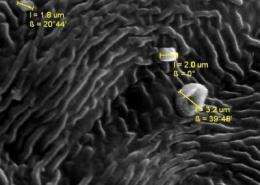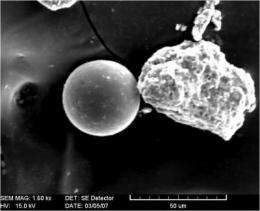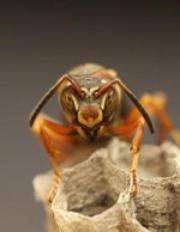Being a standout has its benefits, study shows

Standing out in a crowd is better than blending in, at least if you're a paper wasp in a colony where fights between nest-mates determine social status.
That's the conclusion of a study by University of Michigan researchers published online this week in the journal Evolution.
"It's good to be different, to wear a nametag advertising your identity," said graduate student Michael Sheehan, who collaborated on the research with evolutionary biologist Elizabeth Tibbetts.
In earlier research, Tibbetts showed that paper wasps (Polistes fuscatus) recognize individuals by variations in their facial markings and that they behave more aggressively toward wasps with unfamiliar faces. Then last year, Sheehan and Tibbetts published a paper in Current Biology demonstrating that these wasps have surprisingly long memories and base their behavior on what they remember of previous social interactions with other wasps.

That's important in a species like P. fuscatus, in which multiple queens establish communal nests and raise offspring cooperatively, but also compete to form a linear dominance hierarchy. Remembering who they've already bested -- and been bested by -- keeps individuals from wasting energy on repeated aggressive encounters and presumably promotes colony stability by reducing friction.
In the latest work, Sheehan and Tibbetts wanted to see if individual wasps benefit not only by being able to recognize others, but by being recognizable themselves. Most previous studies of individual recognition---which is found not only in social wasps, but also in a variety of creatures including lobsters, salamanders, penguins and people---have focused only on the presence or absence of the ability in a given species. But little research has centered on the individual being recognized.
To investigate the pros and cons of being a standout, the researchers altered the wasps' facial patterns and set up groups of four unrelated wasp queens, in which three wasps looked alike and one looked distinctively different from the others. The experimenters then videotaped encounters among the wasps and played the tapes back, recording and scoring all acts of aggression.
They found that distinctively-marked wasps were less likely to be the targets of aggression than were look-alike wasps.

"Given that receiving aggression is costly, in terms of injury or energy expenditure, these results indicate that being distinctive is beneficial," Sheehan said.
The benefits of being recognizable may extend beyond wasp societies, Tibbetts said. "For example, have you ever wondered why there is so much variation in human facial features? One possibility is that a mechanism similar to that found in wasps is operating in humans: those with unusual faces, who are easy to identify, may do better than those with more similar faces. Over evolutionary time, this would result in the huge variation in human faces that we see today."
Next, the researchers want to investigate the possible genetic underpinnings of the wasps' naturally occurring facial variations and to look more closely at how whole wasp societies benefit by being made up of distinctive, easily-recognized members.
"We've shown the benefit to an individual of being different," Sheehan said. "Now we want to explore how a group benefits from diversity."
More information: Evolution journal paper: www3.interscience.wiley.com/journal/117958524/home
Source: University of Michigan (news : web)

















